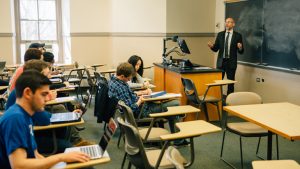Apr 10, 2017
In the Lab
2 p.m. On the bottom floor of Acopian Engineering Center, three students in lab coats cluster around plastic tubes, beakers, and piles of soil. They are…

Do you say “yinz”? Is every carbonated, sugary beverage you drink called a Coke? Hoagie, sub, grinder, or hero? Walter Wadiak, assistant professor of English, teaches how the English language evolves in his 11 a.m. “Whose English?” class.
Eleven students file into Room 113 on the first floor of Pardee Hall. For the next hour, Walter Wadiak, assistant professor of English, tells them how in “Hah-vahd, you pahk the cah in the yahd” and why some people in Pennsylvania say the plural of “you” as “yinz.”
“Do you have a dialect?” Wadiak asks the class. “Some of you may not think so. In some cases, it’s obvious. In others, it’s not.”
It’s American dialects day in Wadiak’s English 320 “Whose English?” class. Students discuss why some Americans speak differently than others— and why the trends survive.
The Middle Atlantic region—home to Lafayette—has one of the most diverse dialects in the nation. Certain trends arise from the region’s Scottish-Irish ancestry. For example, in Northern Ireland hundreds of years ago, native speakers had a plural for the pronoun “you.” Today, correct usage for the word “you”—singular or plural—is “you,” whether you’re talking to your mom or you’re on the PA system at a sold-out Yankees Stadium.
Immigrants new to the language sought to replace that plural “you”, giving rise to colloquialisms like “yuns,” “yins,” and “yous.”
In similar ways, regional dialects have created words like “pop,” “soda,” and “Coke” when each word refers to any carbonated, sugary beverage.
Wadiak has asked his students to complete an online test to see if their hometown could be determined from the way they use and pronounce various words.
“Who here noticed or thought that the quiz got them right?” Wadiak asks.
Nearly everyone raises a hand.
“Who didn’t? … Ethan!”
Ethan Simmons ’18, an English major, nods.
“Why do you think the quiz got you wrong?” Wadiak asks.
“It said I was from Columbus, Ohio,” says Simmons, who is from Pittsburgh. “And after vomiting, I read I could be either from Lincoln or Omaha.”
Simmons attributed the difference to a number of factors. Childhood friends from places like Boston and West Virginia say the word “pop” instead of “soda.” “Also my dad’s dad was a military pilot,” which required him to live in various places.
“Why do we speak the way that we do?” Wadiak asks the class. “Are we copying people that we see on TV? I think we tend to mimic people we love.”
2 p.m. On the bottom floor of Acopian Engineering Center, three students in lab coats cluster around plastic tubes, beakers, and piles of soil. They are…
2:40 p.m. Cece Palmquist ’20 and Emily King ’20 sit across from one another at Mojo 516 Café, one of the popular coffee shops next to campus. They…
1:15 p.m. Biology major Grace Veghte ’19 should be hard at work in a three-hour class. During spring break, however, she hit her head skiing in Utah…